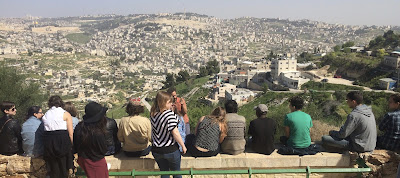Tom Albert, age 25, born in Israel and raised in California, is a current 10-month participant on Tikkun Olam in Tel Aviv-Jaffa. During her time on the program Tom is interning at Latet, Israeli Humanitarian Aid Organization, providing assistance to population groups in distress.
Never in a million
years did I think I'd end up living in Israel again. I mean, I was born here,
and all my extended family still lives here, but I grew up and was raised in
the states.
Sure, I'd visit every summer
and enjoy my time here.
Every day would
be so packed- breakfast with one family, lunch with the cousins, and dinner at
grandparents. Lather, rinse, repeat until the month was over and we'd fly back
home.
Home. It's such a
complicated word for me. I remember when it was time to leave Israel to fly
back to California, our families would take us to the old airport, before the
Ben Gurion Airport was built, and they'd stay with us as we checked in. In that
old airport, the check in counters where on the bottom floor, and to get to
security, passengers would need to go upstairs. I remember riding that
escalator up, crying as I waved goodbye to my Israeli family. I grew to intensely
dislike that escalator, and dreaded it every time we left Israel. We were
leaving one home to go to another. I hated leaving but I loved coming back.
Over the years I
had come to terms with the fact that my family life was different than most. My
friends got to visit their grandparents on the weekends and were best friends
with their cousins. I saw my
grandparents once a year, and as I grew older, knew less and less about the
lives of my cousins. Despite this, I still had such a strong connection to my
Israeli family. But I accepted the fact that I would carry out my life across
the world from them.
That is, until my
parents decided to move back to Israel. After 18 years in the states, they
decided it was time to return home, to be close to the ones they love.
This move was very difficult for me and I knew that it would change a lot. I was
still in graduate school, and did not see Israel as a destination spot in my
future.
However, sometimes
life has a tendency to surprise you. The
first time I visited my family's new home, in Israel, after 5 months of
not seeing my parents or brothers, I felt a connection to Israel that I hadn't
in all the years past that I visited. It didn't feel like a visit anymore, it
felt like this was where I belonged. Immediately after my visit I decided to
look into different programs and options that would get me to Israel. I wanted to discover if I could actually see
myself living in Israel for…ever? I couldn't wait to explore this country, one
that I had always called home yet also always felt like a foreigner. I couldn't
wait to live near my family again and be able to spend Shabbat dinner with
grandparents, aunts, uncles, and cousins.
It has been 8
months since I moved to Israel. During this time I made Israeli friends, danced
at Israeli clubs, visited my grandparents on the weekend, met my new baby
cousin, and (re)connected with my Jewish identity. Tikkun Olam in Tel Aviv-Jaffa gave me the structure I needed, and introduced to my life new best friends from
all over the world. Living in Israel has given me the opportunity to spend time
with my family, be there when my middle brother got drafted to the Air Force,
watch the Superbowl with my dad and little brother, and attend my mom's daycare
holiday party. I get to strengthen the relationships with my cousins, aunts and
uncles that I missed out on for 19 years.
I am not ready to
leave Israel once Tikkun Olam in Tel Aviv-Jaffa ends. I have decided to stay, for now.
However, I miss America. The culture I relate to, the food I love most, the
hobbies I enjoy are all mostly American. My best friends and college
memories are in the states. No matter where I am, I will be missing an
important part of my life. But I'd like to think that my connections are strong
enough to withstand space and time.
They say that home is where the heart is, but
what happens when your heart resides in more than one place? I'd like to
say that it means I'm pretty darn lucky to have my heart be filled with so many
people and so much love. If my hardest challenge in life is that I have too
many loving people in my life who live far away from each other, then I think
I'm one of the luckiest people in the world.











